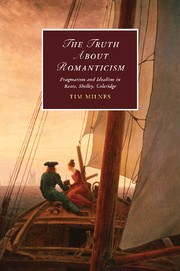Book contents
- Frontmatter
- Contents
- Acknowledgements
- Introduction: The pragmatics of romantic idealism
- 1 Romanticising pragmatism: dialogue and critical method
- 2 Pragmatising romanticism: radical empiricism from Reid to Rorty
- 3 This living Keats: truth, deixis, and correspondence
- 4 An unremitting interchange: Shelley, elenchus, and the education of error
- 5 The embodiment of reason: Coleridge on language, logic, and ethics
- Conclusion
- Notes
- Bibliography
- Index
- CAMBRIDGE STUDIES IN ROMANTICISM
5 - The embodiment of reason: Coleridge on language, logic, and ethics
Published online by Cambridge University Press: 06 July 2010
- Frontmatter
- Contents
- Acknowledgements
- Introduction: The pragmatics of romantic idealism
- 1 Romanticising pragmatism: dialogue and critical method
- 2 Pragmatising romanticism: radical empiricism from Reid to Rorty
- 3 This living Keats: truth, deixis, and correspondence
- 4 An unremitting interchange: Shelley, elenchus, and the education of error
- 5 The embodiment of reason: Coleridge on language, logic, and ethics
- Conclusion
- Notes
- Bibliography
- Index
- CAMBRIDGE STUDIES IN ROMANTICISM
Summary
In his celebrated letter of March 1801 to Thomas Poole, Coleridge portrays himself as a man who, on the threshold of a new century, is undergoing a radical (if not quite sudden) transformation in philosophical outlook. Interleaving the language of violent revolution with the rhetoric of revelation, he writes:
The interval since my last Letter has been filled up by me in the most intense Study. If I do not greatly delude myself, I have not only completely extricated the notions of Time, and Space; but have overthrown the doctrine of Association, as taught by Hartley, and with it all the irreligious metaphysics of modern Infidels –
The familiarity of this performance attests to its success: since Coleridge wrote his letter, the picture of his thought as a flight from a dogmatic materialist associationism to an equally dogmatic, ‘organic’ idealism has weathered well. Underpinned by the early work of Shawcross, Muirhead, Wellek, and Snyder, the scholarly consensus on Coleridge's changing views on the relationship between truth, thought, and language remained remarkably stable throughout the twentieth century. Its persistence has ensured that even today at the shoulder of the image of the Young Coleridge – Pantisocrat, Hartleian, and linguistic radical – there continues to hover the presence of Coleridge the metaphysician: Trinitarian, Kantian, and apostle of the Logos. The sense of inevitability that clings to this conversion narrative, further heightened by an air of political apostasy, is such that even those who argue that Coleridge never quite manages to disentangle himself from the unsettling implications of Hartley's thought continue to chart his career as one that slips beguilingly from uneasy materialism into disingenuous transcendentalism.
- Type
- Chapter
- Information
- The Truth about RomanticismPragmatism and Idealism in Keats, Shelley, Coleridge, pp. 145 - 188Publisher: Cambridge University PressPrint publication year: 2010

